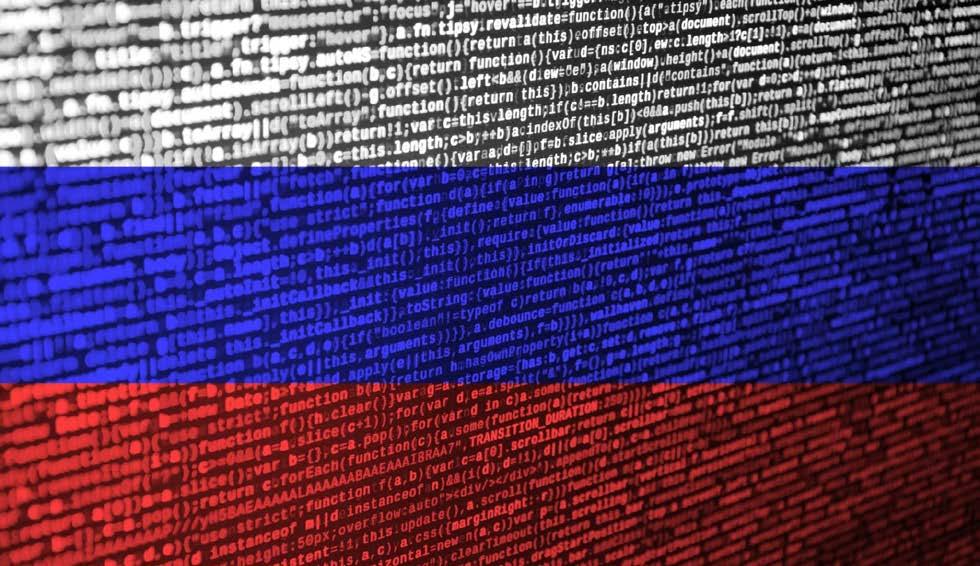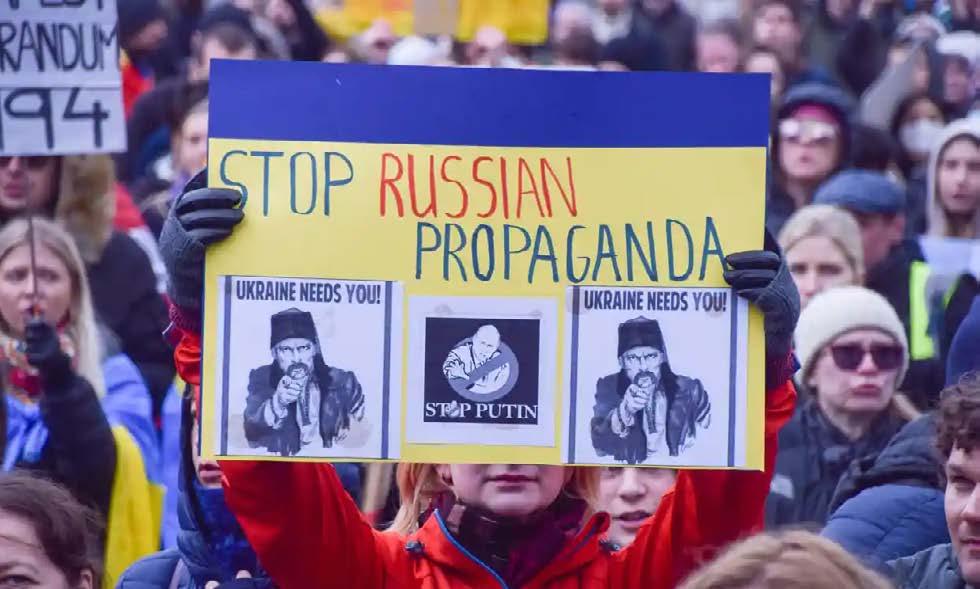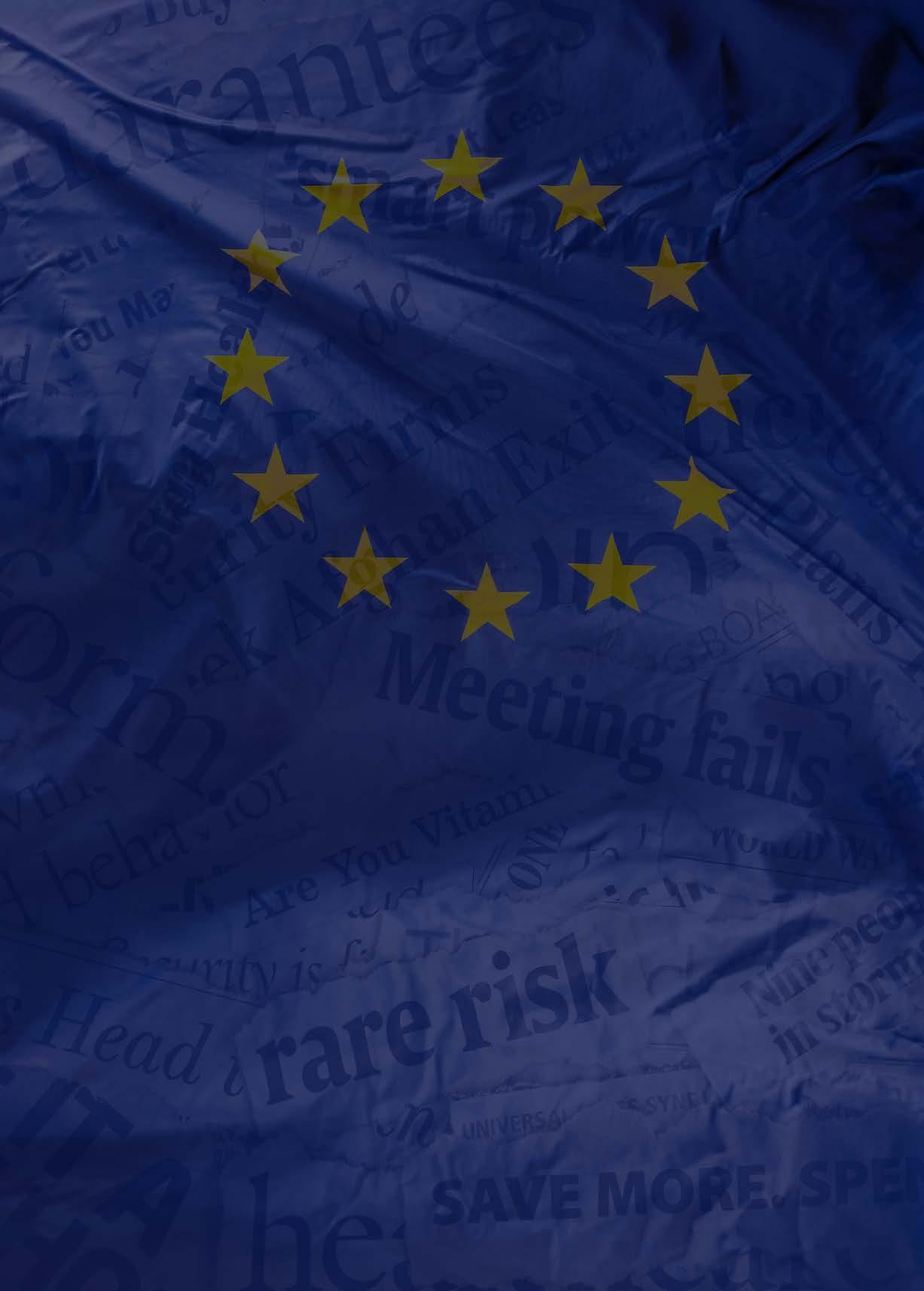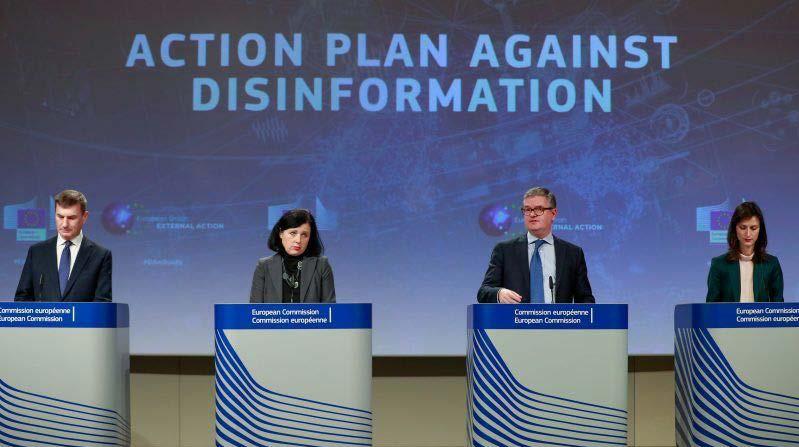Timeline of the EU’s disinformation policy
The EU has taken some actions to counter disinformation––in 2015, it created the East StratCom Task Force to combat Russian disinformation campaigns. The task force’s flagship project is EUvsDisinfo, a website that identifies articles or outlets that provide false or distorted information. Its core objective is to increase public awareness and help citizens in Europe debunk the Kremlin’s disinformation operations. The website so far has collected and documented 15,000 cases of pro-Russian disinformation and has released many reports on the threat 1. The task force is making a major contribution to raising public awareness of Russian disinformation operations in the EU. In December 2015, the Western Balkans Task Force was created to monitor distorted information in the Western Balkans while in June 2017, the Task Force South was founded for the Middle East and North Africa (MENA) as well as the Gulf states 2 . In 2016, the EU Intelligence and Situation Centre established the Hybrid Fusion Cell, an agency tasked with analyzing in-
1. EUvsDisinfo, https://euvsdisinfo.eu/pl/. Accessed: May 24, 2023
telligence on hybrid threats, including disinformation campaigns, within the EU and outside it 3. The European Union counters hybrid threats in partnership with the North Atlantic Alliance (NATO). In 2017, the European Centre of Excellence for Countering Hybrid Threats (Hybrid CoE) was established in Helsinki, Finland 4 Hybrid CoE is an autonomous organization that spots hybrid threats. It cooperates closely with the EU and NATO. The Center provides training and analysis as well as helps member states build capabilities to combat hybrid threats.
The European Commission first recognized disinformation threats and set out the next steps to combat fake news in its April 2018 communication titled Tackling online disinformation: a European Approach5. The communication draws on some analytical input from a high-level expert group. According to the European Commission, online disinformation campaigns are being widely used by a range of domestic and foreign actors to sow distrust, create social tensions, and
2. EEAS, Tackling disinformation: Information on the work of the EEAS Strategic Communication division and its task forces, October 12, 2021, https://www.eeas.europa.eu/countering-disinformation/tackling-disinformation-information-work-eeas-strategic-communication_en?s=2803 Accessed: May 24, 2023
3. P. Szymański, NATO i Unia Europejska wobec zagrożeń hybrydowych, OSW, April 24, 2020, https://www.osw.waw.pl/pl/publikacje/komentarze-osw/2020-04-24/nato-i-unia-europejska-wobec-zagrozen-hybrydowych. Accessed: May 24, 2023.
4. Hybrid CoE, https://www.hybridcoe.fi/about-us/. Accessed: May 24, 2023.
5. JOINT COMMUNICATION TO THE EUROPEAN PARLIAMENT, THE EUROPEAN COUNCIL, THE COUNCIL, THE EUROPEAN ECONOMIC AND SOCIAL COMMITTEE AND THE COMMITTEE OF THE REGIONS Tackling COVID-19 disinformation - Getting the facts right, June 10, 2020, https://eur-lex.europa.eu/legal-content/EN/TXT/?uri=CELEX: 52020JC0008. Accessed: May 24, 2023
3 www.warsawinstitute.org Special Report THE EU’S EFFORTS TO COMBAT DISINFORMATION
erode trust in public institutions. The Internet has not only vastly increased the volume and variety of news available to citizens but has also profoundly changed the ways citizens access and engage with news, the communication stated. Most importantly, according to the European Commission, disinformation has become a powerful and inexpensive tool of influence. The EU referred to Russian disinformation campaigns that helped the Kremlin meddle in political decisions in EU states. Importantly, in its communication, the European Commission has provided roadmaps for implementation from partners in the private sector. First, it provides for improving transparency regarding the origin of information and the way it is produced, sponsored, disseminated, and targeted to enable citizens to assess the content they access online and to reveal possible attempts to manipulate opinion. Essentially, according to the communication, online platforms play a key role in the spread and amplification of online disinformation. Consequently, the Commission urged their representatives to redress the spread of false information online. It is essential to involve online platforms as it is where most fake content is uploaded and disseminated. The second field of activity concerns secure and resilient election processes. The document states that disinformation campaigns by third countries can be part of hybrid threats to internal security, including election processes. The remaining fields of action involve efforts to foster education and media literacy, support for quality journalism as an essential element of a democratic society, and steps to counter internal and external disinformation threats through strategic communication.
In this regard, the roadmaps laid the groundwork for building on the Code of 6 Practice on Disinformation, released in September 2018. With the document, the industry agreed for the
first time worldwide and voluntarily to self-regulatory standards to fight disinformation. The code involved also academic scholars and civil society organizations. It included specific business commitments to tackling disinformation and recognized the importance of efforts to:
z ensure transparency about sponsored content,
z identify fake accounts and bots,
z take reasonable measures to ensure transparency about algorithms,
z offer access to vast sources of information,
z improve the ability of researchers and civil society groups to monitor the scope and scale of political advertising.
The code also laid out a set of guidelines for the business sector: distinguishing political advertising, putting in place clear policies regarding identity and the misuse of automated bots, providing relevant data on the functioning of online services including data for independent investigation by academic researchers and general information on algorithms.
In December 2018, the European Commission launched its Action Plan Against Disinformation, a key pillar of EU policy that identified disinformation as a major challenge ahead of the European Parliament election 7. The paper highlighted the need to improve the capabilities of EU institutions to detect, analyze, and expose disinformation, notably by providing bigger support to the EU’s task forces. The action plan recommended an expansion of resources and capabilities, as well as the creation of a Rapid Alert System to strengthen coordination among EU institutions and member states. The document also underscored the role of mobilizing the private
6. EU Code of Practice on Disinformation, 2018, https://digital-strategy.ec.europa.eu/en/library/2018-code-practice-disinformation. Accessed: May 24, 2023
7. JOINT COMMUNICATION TO THE EUROPEAN PARLIAMENT, THE EUROPEAN COUNCIL, THE COUNCIL, THE EUROPEAN ECONOMIC AND SOCIAL COMMITTEE AND THE COMMITTEE OF THE REGIONS Action Plan against Disinformation, December 5, 2018, https:// eur-lex.europa.eu/legal-content/EN/ALL/?uri=CELEX: 52018JC0036. Accessed: May 24, 2023
4 www.warsawinstitute.org Special Report THE EU’S EFFORTS TO COMBAT DISINFORMATION
SOURCE: EUVSDISINFO.EU
sector to tackle disinformation as well as raising awareness and improving societal resilience. The Rapid Alert System was launched in March 2019 to enable common situational awareness related to disinformation spread across EU member states, as well as the development of common responses. 8 The system consists of a rudimentary platform for information sharing, as well as a network of points of contact in the various EU member states. EU member states shared information through t he Rapid Alert System in 2020 amid fake news that Russia would spread about Covid-19 vaccines 9 .
Disinformation has been an ongoing threat to the EU during the coronavirus pandemic as false or distorted information on the virus, vaccines, and tests were disseminated mostly online. During the Covid-19 pandemic, many rumors and conspiracy theories spread in various media outlets, causing an infodemic of misinformation and disinformation. Consequently, in June 2020, the European Commission released a communication titled Tackling Covid-19 Disinformation – Getting
the facts right. The document enabled common situational awareness related to the pandemic disinformation 10 . The document pledged to further strengthen strategic communications and public diplomacy capabilities between EU institutions and the bloc’s member states as well as third countries and other international partners. The EU has also taken action to provide people around the world, notably in the countries of Africa and the Western Balkans, with up-to-date and consistent information.
The European Digital Media Observatory (EDMO) became operational in June 2020. Its tasks are centered on building civil resilience to disinformation and promoting tools for media education. The EDMO comprises eight regional hubs whose researchers, fact-checkers, and journalists detect disinformation operations, launch awareness-raising campaigns, and help national agencies monitor online platforms 11
8. A. Szczęsna, Przeciwdziałanie dezinformacji w świetle projektowanych zmian prawnych, NASK, July 26, 2022, https://cyberpolicy.nask.pl/przeciwdzialanie-dezinformacji-w-swietle-projektowanych-zmian-prawnych/. Accessed: May 24, 2023.
9. Bryjka F., Rozwój unijnych zdolności do zwalczania zagrożeń hybrydowych, PISM, August 1, 2022, https://pism.pl/publikacje/rozwoj-unijnychzdolnosci-do-zwalczania-zagrozen-hybrydowych Accessed: May 24, 2023
10. JOINT COMMUNICATION TO THE EUROPEAN PARLIAMENT, THE EUROPEAN COUNCIL, THE COUNCIL, THE EUROPEAN ECONOMIC AND SOCIAL COMMITTEE AND THE COMMITTEE OF THE REGIONS Tackling COVID-19 disinformation - Getting the facts right, June 10, 2020, https://eur-lex.europa.eu/legal-content/EN/TXT/?uri=CELEX:52020JC0008. Accessed: May 24, 2023
11. European Digital Media Observatory, https://edmo.eu/. Accessed: May 24, 2023

5 www.warsawinstitute.org Special Report THE EU’S EFFORTS TO COMBAT DISINFORMATION
EU efforts to counteract disinformation after the Russian invasion of Ukraine
After invading Ukraine, Moscow ramped up all disinformation efforts targeting the EU and its member states to erode support for Ukraine, cover up war crimes, and spread a negative narrative on Ukraine in Western societies. Some of the Russian disinformation has been targeted against Ukrainian refugees, who are portrayed as a danger to society. Russian information operations to erode support for Ukraine usually use bots and trolls. Artificial intelligence is also being used to record fake footage, including a fake Zelensky video that went viral, or to create fake user accounts.
The EU banned Russian state-controlled media outlets RT, Sputnik, Rossiya RTP, Rossiya 24, and TV Centre International in the bloc with immediate effect for systematic disinformation over Russia’s invasion of Ukraine. Consequently, broadcasting licenses or authorization, transmission, and distribution arrangements between the two companies and their EU counterparts were suspended 12 . Some countries, including Poland, Lithuania, Latvia, and Estonia, curbed the
activity of some Russian outlets under the 2010 Audiovisual Media Services Directive (AVMSD).
In March 2022, the EU Council formally approved the Strategic Compass, an ambitious plan of action for a stronger EU security and defense policy. The paper emphasized a few areas of work, including developing state resilience to foreign manipulation techniques and added a handful of new tools within the EU Hybrid Toolbox 13. New toolkit available to all EU nations was designed to make it easier to identify and counteract the full extent of disinformation campaigns.
In the same year, the European Commission amended its 2018 Code of Practice on Disinformation 14 to add some new guidelines on self-regulating business mechanisms. The document set a broader range of commitments and measures to counter online disinformation such as demonetizing the dissemination of disinformation, ensuring the transparency of political advertising, and providing a better insight into new malign activities. In addition, the amended
12. EU sanctions against Russia explained , Europa.eu , https://www.consilium.europa.eu/en/policies/sanctions/restrictive-measures-against-russia-over-ukraine/sanctions-against-russia-explained/#sanctions. Accessed: May 24, 2023
13. Council conclusions on a Framework for a coordinated EU response to hybrid campaigns, Europa.eu, June 21, 2022, https://www.consilium.europa. eu/en/press/press-releases/2022/06/21/council-conclusions-on-a-framework-for-a-coordinated-eu-response-to-hybrid-campaigns/. Accessed: May 24, 2023
14. The 2022 Code of Practice on Disinformation, 2022,https://digital-strategy.ec.europa.eu/en/policies/code-practice-disinformation. Accessed: May 24, 2023
6 www.warsawinstitute.org Special Report THE EU’S EFFORTS TO COMBAT DISINFORMATION
code provided enhanced tools to recognize, understand, and flag disinformation. The document also came with a strengthened monitoring framework and better access to data for researchers.
In February 2023, the European External Action Service (EEAS) released its first report on Foreign Information Manipulation and Interference (FIMI). Russia launched disinformation campaigns to distort reality and distract public attention from its invasion of Ukraine, the document stated. The report also confirmed that Russia had used disinformation techniques to disseminate fake videos and images 15 .

The EU is preparing a Digital Services Act (DSA), which will be launched in 2024. Among other things, this measure will set out regulatory powers for the EU over digital platforms to combat illicit content and disinformation 16 Adopted in 2000, the e-Commerce Directive has
SOURCE: SECURINGDEMOCRACY.GMFUS.ORG
been the main legal framework for the provision of digital services in the EU. However, much has changed since then and the rules needed to be upgraded. The new act applies to all digital services providers and, more importantly, online platforms and search engines. The DSA makes it mandatory for all hosting providers to:
z report illegal content easily and effectively,
z give the possibility to challenge platforms’ content moderation decisions based on new obligatory information to users when their content gets removed or restricted,
z reporting offenses that may endanger life or public safety,
z banning all platforms that distribute illegal content upon prior warning,
z designing interfaces that do not deceive, manipulate or otherwise materially distort or impair the ability of users of their services to make free and informed decisions.
15. EEAS, 1st EEAS Report on Foreign Information Manipulation and Interference Threats Towards a Framework for networked defense, 2023, https:// euvsdisinfo.eu/uploads/2023/02/EEAS-ThreatReport-February2023-02.pdf Accessed: May 24, 2023
16. A. Szczęsna, Akt o usługach cyfrowych, NASK, October 5, 2022, https://cyberpolicy.nask.pl/akt-o-uslugach-cyfrowych/. Accessed: May 24, 2023.
7 www.warsawinstitute.org Special Report THE EU’S EFFORTS TO COMBAT DISINFORMATION
Conclusions
Russia’s disinformation campaigns present a constant security challenge to EU institutions and its member nations. Disinformation is a widely accessible weapon that costs little yet may cause much harm to society. Russia is likely to further expand its disinformation campaigns against the EU, also through cutting-edge techniques that involve social media and other media-related tools.
The Kremlin is waging asymmetrical informational warfare against the EU whose member states do not target Moscow with similar strategies. The EU’s activities are centered on combatting Russian disinformation schemes while providing reliable content. EU disinformation task forces are tasked with researching and monitoring Russian disinformation efforts while limiting their scope. Online platforms, in particular social media, occupy a vital role in the activities of EU institutions. Kremlin-loyal outlets have amplified disinformation narratives on social media since
the EU sanctioned major Russian state-run TV channels. The Digital Services Act, which compels online platforms to remove illegal content, may be a milestone in combatting disinformation. However, whether it provides effective depends on its ability to make online platforms abide by new obligations and commitments.
In addition, deep fake technology has become increasingly convincing and accessible to the public––through manipulated videos or audio recordings. It is difficult to detect well-prepared deepfake content without a set of adequate tools. It is therefore essential to develop new technologies capable of distinguishing fake content. Content filtering tools are also critical for identifying fake content.
8 www.warsawinstitute.org Special Report THE EU’S EFFORTS TO COMBAT DISINFORMATION
References
Bryjka F., Rozwój unijnych zdolności do zwalczania zagrożeń hybrydowych, PISM, August 1, 2022, https://pism.pl/publikacje/rozwoj-unijnychzdolnosci-do-zwalczania-zagrozen-hybrydowych.
Accessed: May 24, 2023.
Council conclusions on a Framework for a coordinated EU response to hybrid campaigns, Europa. eu, June 21, 2022, https://www.consilium.europa. eu/en/press/press-releases/2022/06/21/councilconclusions-on-a-framework-for-a-coordinatedeu-response-to-hybrid-campaigns/. Accessed: May 24, 2023.
EEAS, 1st EEAS Report on Foreign Information Manipulation and Interference Threats Towards a Framework for networked Defence, 2023, https://
euvsdisinfo.eu/uploads/2023/02/EEAS-ThreatReport-February2023-02.pdf. Accessed: May 24, 2023.
EEAS, Tackling disinformation: Information on the work of the EEAS Strategic Communication division and its task forces , October 12, 2021, https://www.eeas.europa.eu/countering-disinformation/tackling-disinformation-information-work-eeas-strategic-communication_ en?s=2803. Accessed: May 24, 2023.
EU Code of Practice on Disinformation , 2018, https://digital-strategy.ec.europa.eu/en/library/2018-code-practice-disinformation . Accessed: May 24, 2023.

9 www.warsawinstitute.org Special Report THE EU’S EFFORTS TO COMBAT DISINFORMATION
SOURCE: VUK VALCIC, ZUMA PRESS WIRE, REX, SHUTTERSTOCK
JOINT COMMUNICATION TO THE EUROPEAN PARLIAMENT, THE EUROPEAN COUNCIL, THE COUNCIL, THE EUROPEAN ECONOMIC AND SOCIAL COMMITTEE AND THE COMMITTEE OF THE REGIONS Action Plan against Disinformation, December 5, 2018, https://eur-lex.europa.eu/legal-content/EN/ALL/?uri=CELEX: 52018JC0036. Accessed: May 24, 2023.
EU sanctions against Russia explained , Europa. eu , https://www.consilium.europa.eu/en/ policies/sanctions/restrictive-measures-againstrussia-over-ukraine/sanctions-against-russia-explained/#sanctions. Accessed: May 24, 2023.
European Digital Media Observatory, https:// edmo.eu/. Accessed: May 24, 2023
EUvsDisinfo, https://euvsdisinfo.eu/pl/. Accessed: May 24, 2023.
Hybrid CoE, https://www.hybridcoe.fi/about-us/. Accessed: May 24, 2023.
Szczęsna A., Akt o usługach cyfrowych , NASK, October 5, 2022, https://cyberpolicy.nask.pl/akt-o-uslugach-cyfrowych/. Accessed: May 24, 2023.
A. Szczęsna, Przeciwdziałanie dezinformacji w świetle projektowanych zmian prawnych , NASK, July 26, 2022, https://cyberpolicy.nask. pl/przeciwdzialanie-dezinformacji-w-swietleprojektowanych-zmian-prawnych/. Accessed: May 24, 2023.
P. Szymański, NATO i Unia Europejska wobec zagrożeń hybrydowych , OSW, April 24, 2020, https://www.osw.waw.pl/pl/publikacje/komentarze-osw/2020-04-24/nato-i-unia-europejska-wobec-zagrozen-hybrydowych. Accessed: May 24, 2023
The 2022 Code of Practice on Disinformation , 2022, https://digital-strategy.ec.europa.eu/en/ policies/code-practice-disinformation. Accessed: May 24, 2023.
JOINT COMMUNICATION TO THE EUROPEAN PARLIAMENT, THE EUROPEAN COUNCIL, THE COUNCIL, THE EUROPEAN ECONOMIC AND SOCIAL COMMITTEE AND THE COMMITTEE OF THE REGIONS Tackling COVID-19 disinformation - Getting the facts right, June 10, 2020, https://eur-lex.europa.eu/legal-content/EN/TXT/?uri=CELEX:52020JC0008 Accessed: May 24, 2023
COMMUNICATION FROM THE COMMISSION TO THE EUROPEAN PARLIAMENT, THE COUNCIL, THE EUROPEAN ECONOMIC AND SOCIAL COMMITTEE AND THE COMMITTEE OF THE REGIONS.Tackling online disinformation: a European Approach, April 26, 2018https:// eur-lex.europa.eu/legal-content/PL/ALL/?uri=CELEX:52018DC0236. Accessed: May 25, 2023.
10 www.warsawinstitute.org Special Report THE EU’S EFFORTS TO COMBAT DISINFORMATION
Autor: Mikołaj Rogalewicz
Senior analyst at the Demagog Association, a fact-checking organization. Author of numerous articles and analyses devoted to international relations, fact-checking, and disinformation. Participant of Kremlin Watchers Movement project, in which he deals with Russian disinformation. At various conferences, he presented papers on disinformation, cyberterrorism, Russian-Ukrainian conflict, and efforts to solve it, as well as actions of the EU aimed at combating terrorism. He is a mentor of the Akademia Fact-Checkingu.
11 www.warsawinstitute.org Special Report THE EU’S EFFORTS TO COMBAT DISINFORMATION
The opinions given and the positions held in materials in the Special Report solely reflect the views of authors.

Warsaw Institute
Wilcza St. 9, 00-538 Warsaw, Poland +48 22 417 63 15 office@warsawinstitute.org
COPYRIGHT
©
2023 Warsaw Institute
SFINANSOWANO
PROGRAMU ROZWOJU ORGANIZACJI OBYWATELSKICH PROO1A NA LATA 2018-2030.
ZE ŚRODKÓW NARODOWEGO INSTYTUTU WOLNOŚCI - CENTRUM ROZWOJU SPOŁECZEŃSTWA OBYWATELSKIEGO W RAMACH RZĄDOWEGO






